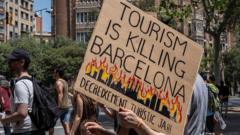Rob Jetten's achievement in dragging his socially liberal D66 party from a distant fifth to the forefront of Dutch politics in less than two years is nothing short of extraordinary. Politically, the stars seem perfectly aligned, as the latest election has left the results too close to call. Jetten is in a tight race against anti-Islam populist Geert Wilders for the most seats in parliament.
Jetten managed to command unparalleled media attention during the campaign, taking advantage of every opportunity to connect with voters. His cheerful message and smile resonated with the masses, contrasting sharply with his rivals, who struggled under pressure. Hardly a night went by without his presence on television. When Wilders canceled a public appearance due to security fears, Jetten eagerly stepped in, showing a mix of charisma and preparedness.
More than anything, his optimistic slogan, Het kan wel (It can be done), borrowed from Barack Obama's 'Yes, we can,' captured the attention and hearts of voters. If successful, he could become the first openly gay Prime Minister of the Netherlands. Jetten's journey from a small-town upbringing in Brabant to front-runner in Dutch politics adds a personal narrative to his political path.
However, not everything has been smooth sailing. Despite a promising career, Jetten faced a challenging environment marked by rising energy prices due to political turmoil in Europe. His past struggles, including a lackluster campaign in 2023, where the D66 party performed poorly, have left him with a reputation to rebuild.
As Jetten steps into a role that could define his political legacy, tackling the pressing housing crisis will be his most significant challenge. He aims to foster growth and build ambitious projects, including ten new cities to combat the 400,000 housing shortage currently plaguing the Netherlands.
Despite previous missteps in public engagements, such as a poorly received joke about the Crown Princess, he has shown the ability to adapt and maintain his momentum in the race. Comparisons to the previous Prime Minister Mark Rutte, characterized by pragmatism and optimism, have become common, indicating public longing for stability after a period of upheaval.


















